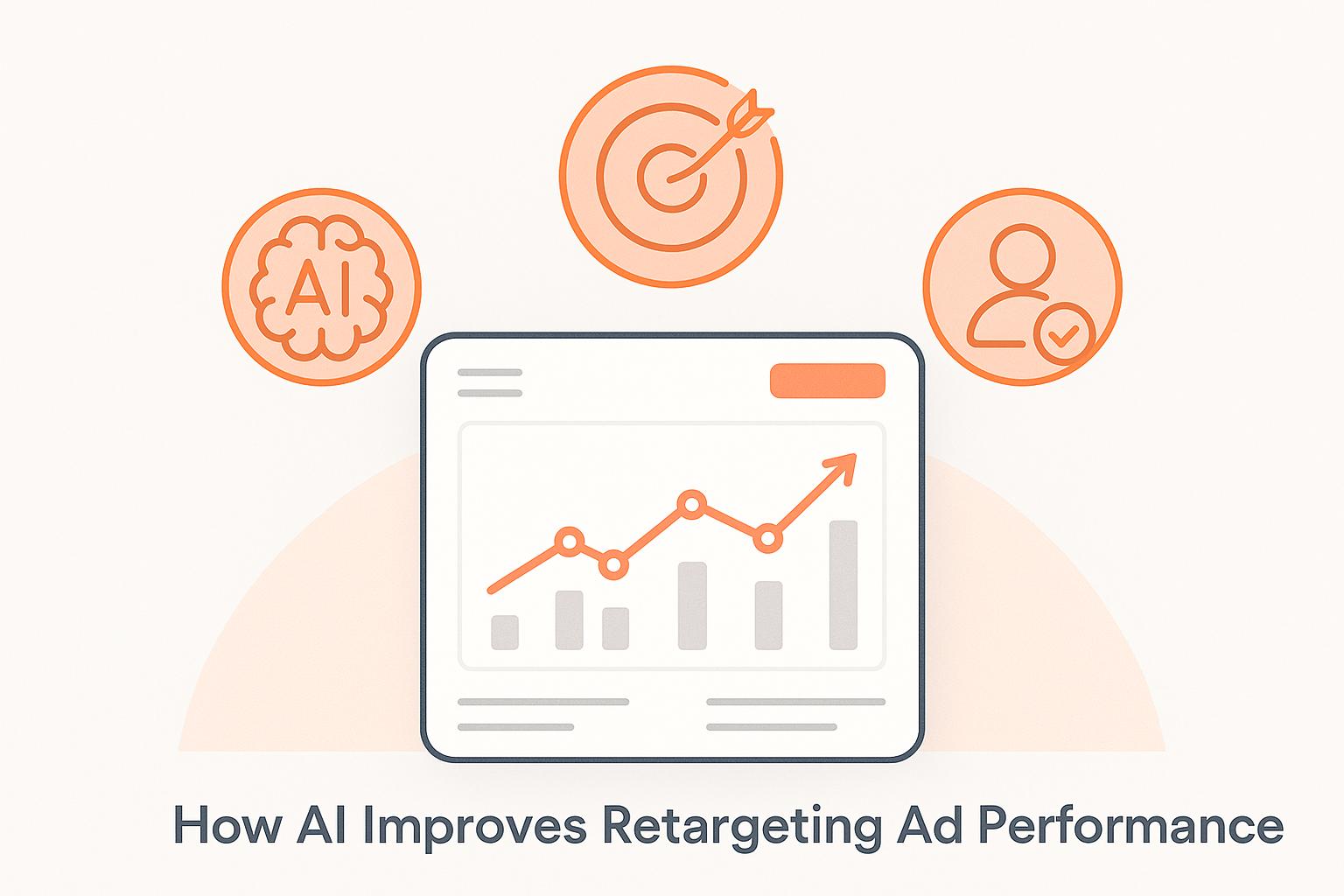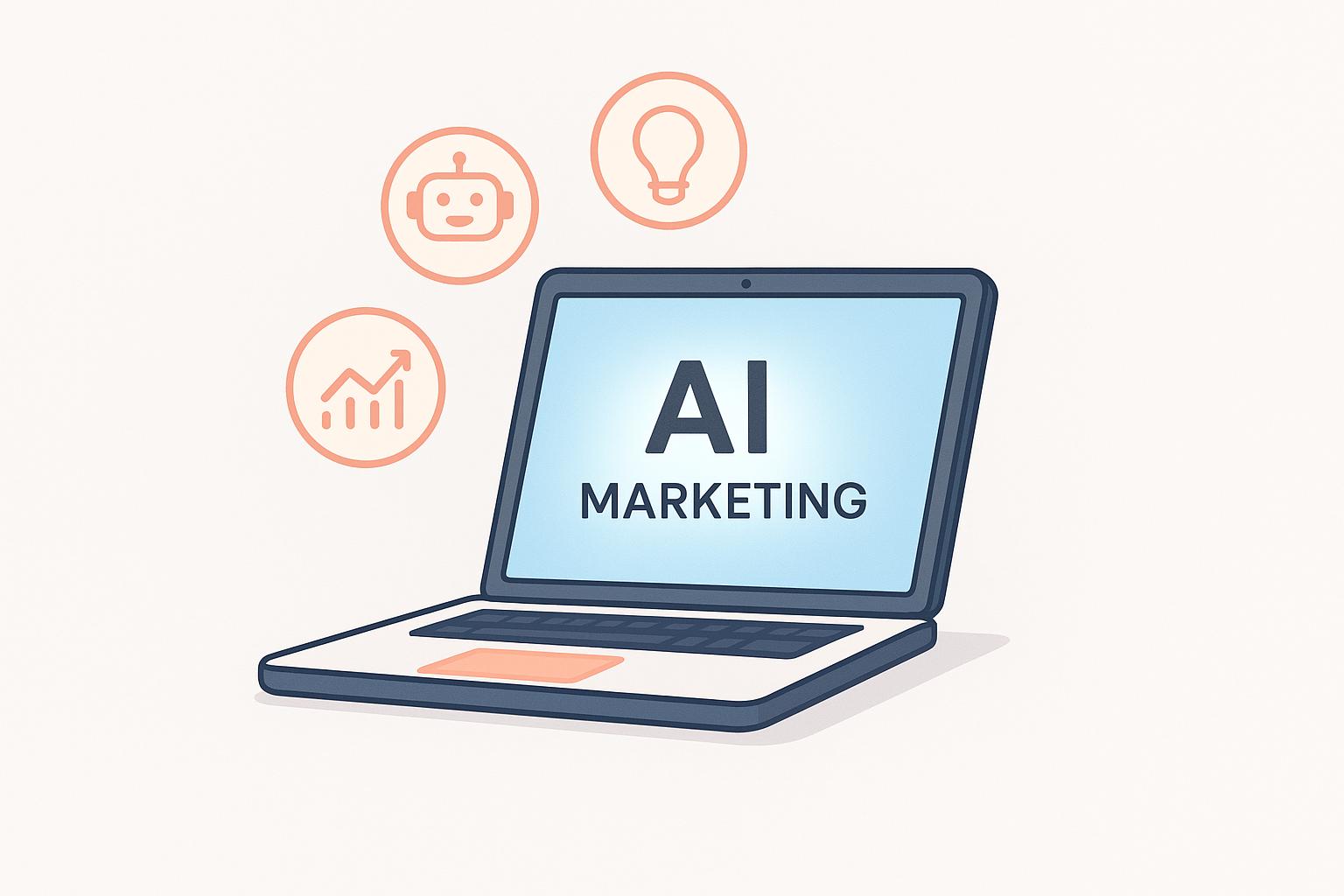- Why it matters: 68% of online experiences begin with a search engine, and 53.3% of traffic comes from organic search.
- Who’s using it: 67% of small businesses already leverage AI for SEO, with 92.1% reporting results.
- Time saved: AI tools can save up to 12.5 hours per week on content tasks.
- Profitability boost: Companies using AI see up to a 20% increase in profitability.
Top 5 AI SEO Tools for Small Businesses:
- Semrush Content Toolkit ($60/month): Keyword research, content briefs, and real-time optimization.
- Surfer SEO ($99/month): Data-driven content scoring and competitor analysis.
- HubSpot SEO Assistant (Free–$800/month): SEO tools integrated with marketing and CRM.
- Scalenut ($49/month): Combines keyword research, content creation, and optimization.
- MarketMuse ($99/month): Advanced topic modeling and content strategy insights.
Quick Comparison
| Tool | Starting Price | Key Features | Best For |
|---|---|---|---|
| Semrush | $60/month | Keyword research, content briefs, integration | Comprehensive SEO tasks |
| Surfer SEO | $99/month | Real-time optimization, competitor analysis | Content-focused SEO strategies |
| HubSpot SEO | Free–$800/month | SEO + marketing automation, CRM integration | Businesses using HubSpot ecosystem |
| Scalenut | $49/month | Keyword planning, AI content creation | Budget-friendly, all-in-one tools |
| MarketMuse | $99/month | Topic modeling, content gap analysis | Advanced content strategies |
AI SEO tools can simplify SEO, save time, and drive results. Whether you're starting small or scaling up, choose a tool that fits your needs and budget.
11 Best AI SEO Tools in 2024 (Ranked by Categories)
1. Semrush Content Toolkit

The Semrush Content Toolkit is an AI-powered solution designed to simplify content creation and optimization for small businesses. With a database boasting over 26 billion keywords, it merges Semrush's robust SEO data with artificial intelligence to help create content that ranks well in search engines.
Keyword Optimization
At the heart of this toolkit is its focus on keyword optimization. The Keyword Magic Tool helps businesses uncover thousands of organic keywords from a single seed term. It uses match modifiers - such as broad, phrase, exact, and related matches - to refine results. Built-in filters make it easy to pinpoint low-competition and question-based keywords, which are especially useful for targeting niche audiences.
Adding to this is the Topic Finder, a feature that goes beyond typical research to generate content ideas backed by traffic data. Businesses can also rely on the Keyword Overview Tool to analyze critical metrics like search volume, keyword difficulty, user intent, and cost-per-click. Together, these tools ensure that content aligns with audience needs and search trends.
Content Scoring and Planning
Creating structured, SEO-optimized content can be a challenge, but the toolkit's planning features simplify the process. The SEO Brief Generator analyzes keywords and top-ranking competitors to produce detailed content briefs. These briefs include organized keyword clusters and insights into search intent, making it easier for small businesses to compete effectively.
The Content Optimizer takes things a step further by evaluating drafts for SEO performance, tone consistency, and readability. It offers real-time feedback to help refine content. As Vanhishikha Bhargava, founder of Contensify, explains:
"It has really simplified keyword research, generating content ideas and, most importantly, creating SEO-friendly content briefs for the team we have hired."
– Vanhishikha Bhargava, Founder at Contensify
Additionally, the SEO Writing Assistant provides suggestions during the writing process, checking for SEO alignment, originality, tone consistency, and readability. This is particularly helpful for small businesses that lack in-house SEO expertise.
Integration Capabilities
The Semrush Content Toolkit integrates seamlessly into existing workflows through its Chrome Browser Extension. This feature allows marketers to access SEO insights and recommendations directly within their writing platforms. By tapping into Semrush's competitive intelligence data, businesses can analyze successful strategies and incorporate proven techniques into their own content plans.
ROI and Cost Efficiency
For $60 per month after a 7-day free trial, the toolkit includes all essential features and five SEO-optimized articles per month, with additional articles available for $30 each.
This pricing model is especially appealing given the time and cost savings the toolkit offers. For instance, 36% of marketers report spending less than an hour on long-form blog posts, and 51% of small businesses say they no longer need to invest extra resources in long-form content thanks to AI tools. Moreover, 68% of businesses report higher returns on content marketing efforts due to AI integration.
As Adam Connell, a marketing strategist at Helianthus Advising, puts it:
"Content Toolkit makes it easy to create content that's optimized for search and users. It's a time saver for every step of the content creation process. I highly recommend it."
– Adam Connell, Marketing Strategist, Helianthus Advising
Research underscores these benefits, showing the toolkit can reduce content creation time by up to 90% while increasing organic traffic by 67% in tested cases. For small businesses, where time and budget are often limited, these efficiency gains are invaluable.
Next, we'll explore another standout tool, Surfer SEO, to continue the comparison.
2. Surfer SEO
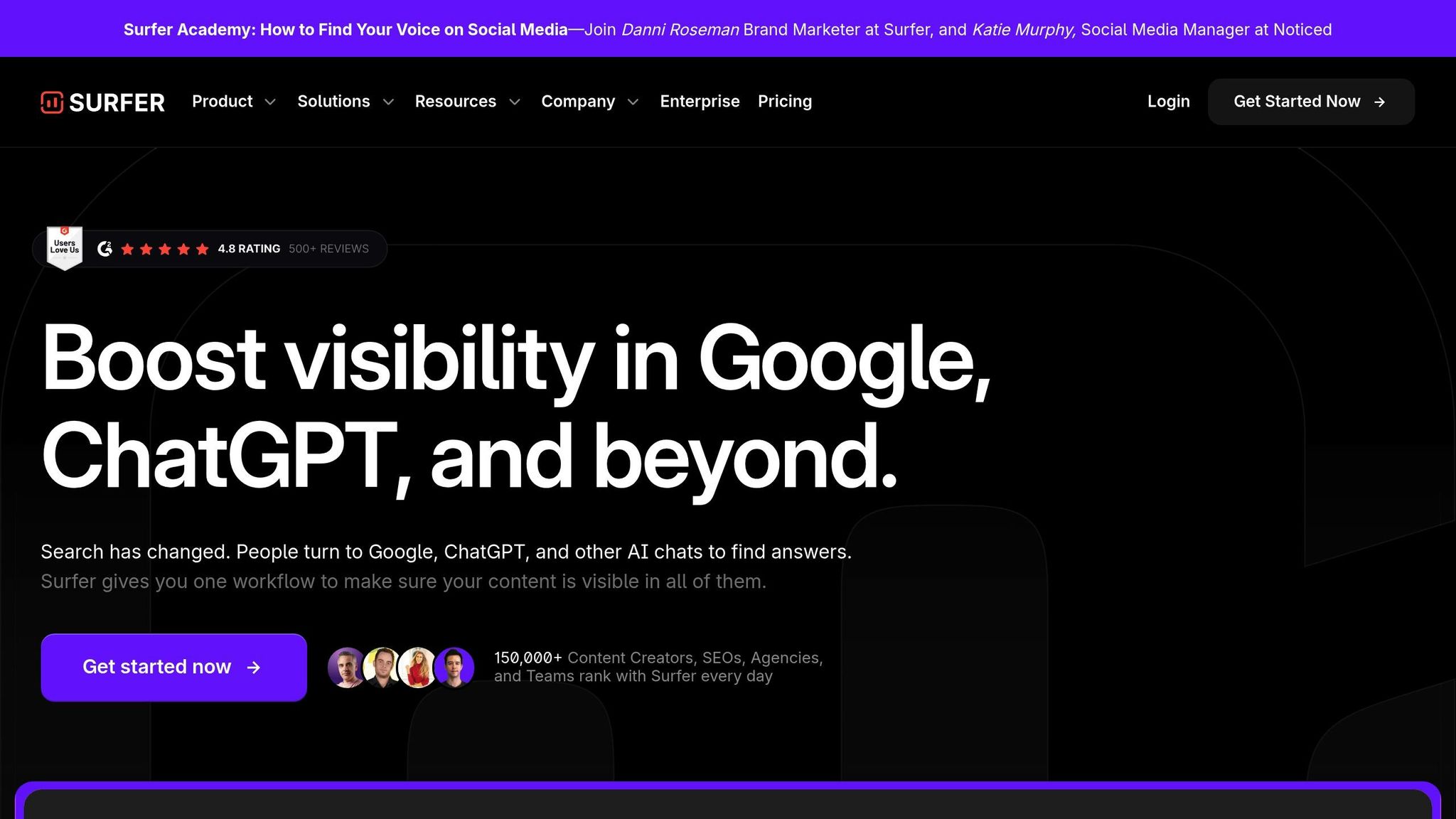
Surfer SEO builds on the efficiency of tools like Semrush by offering a streamlined, data-driven approach to content optimization. Analyzing over 500 signals from top-ranking pages, it provides actionable recommendations tailored for small businesses. With a strong 4.8-star rating from over 500 reviews and users in more than 140 countries, Surfer SEO has established itself as a reliable tool for creating content that performs well in search engines.
Keyword Optimization
At the heart of Surfer SEO is its Keyword Research feature, which simplifies keyword discovery and clustering. This allows small businesses to identify relevant keywords effortlessly and leverage Surfer's AI to generate optimized articles.
What makes Surfer stand out is its precision in keyword implementation. By analyzing top-performing competitors, it offers detailed guidance on keyword density, placement, and related terms. This eliminates much of the trial and error for users who may not have advanced SEO knowledge.
Matt Diggity, CEO and Founder of Diggity Marketing, highlights its effectiveness:
"Surfer is a quick yet extremely accurate way to get data-driven advice for your site. I've seen ranking gains in many different niches by applying its suggestions. Bonus: It takes the data and presents it in such a way that even beginner SEOs would understand so... you can outsource the actions as well."
These keyword insights seamlessly tie into Surfer’s broader content planning tools, making it a comprehensive solution for SEO.
Content Scoring and Planning
Surfer's Content Editor offers real-time optimization as you write, providing recommendations on word count, keyword usage, and other on-page elements. Its AI Outline Generator uses competitor data and targeted keywords to create structured content outlines, saving users time and effort.
The Content Audit feature is particularly useful for improving existing content. By analyzing meta tags, keyword usage, and content length, it pinpoints areas for enhancement. Additionally, the Topical Map (Content Planner) helps identify content gaps and guides the development of broader strategies.
One notable success story comes from matthewwoodward.co.uk, where Surfer's analysis led to the removal of 22,000 words of content. After cutting 85% of the content - including 901 blog comments - the site jumped to the number one position in just two days.
Jeremy Galante, Senior SEO Manager at ClickUp, shares his experience:
"Surfer has quickly become essential in our SEO workflow at ClickUp... Content Planner automates steps and the NLP engine enhances our toolbox."
Integration Capabilities
Surfer SEO integrates smoothly with platforms like Google Docs and Jasper, allowing users to optimize content within familiar workflows. Its Google Search Console integration further streamlines content planning by automating key optimization steps.
Agencies report noticeable productivity improvements thanks to these integrations. Writers receive clear instructions on word count, keyword placement, and topic suggestions, speeding up the content creation process significantly.
These integrations make Surfer a practical choice for teams looking to enhance productivity while maintaining competitive SEO performance.
ROI and Cost Efficiency
Surfer SEO’s pricing starts at $99 per month for the Essential plan, with an option to save 20% by choosing annual billing. The plan includes 120 Content Editor articles per year and unlimited keyword research.
The return on investment (ROI) can be impressive. For instance, Daan van Lonkhuizen, Owner at Dapper Marketing, shared a case study involving a Power BI client:
"Surfer delivered 100% organic traffic growth, 150 new leads, and 3 sales for a client in 2 months."
This success came from updating old content and creating new, topic-focused pages, resulting in 150 warm leads, three of which converted into high-ticket sales.
For small businesses, Surfer’s AI-driven approach saves time and delivers results. The tool’s ability to elevate pages from mid-tier rankings (positions 15–17) to the top three underscores its impact on organic visibility.
Lauren Petrullo, Founder of Mongoose Media, sums it up perfectly:
"We love Surfer so much that if we had to choose one SEO tool to live with forever, it would be Surfer."
3. HubSpot SEO Assistant
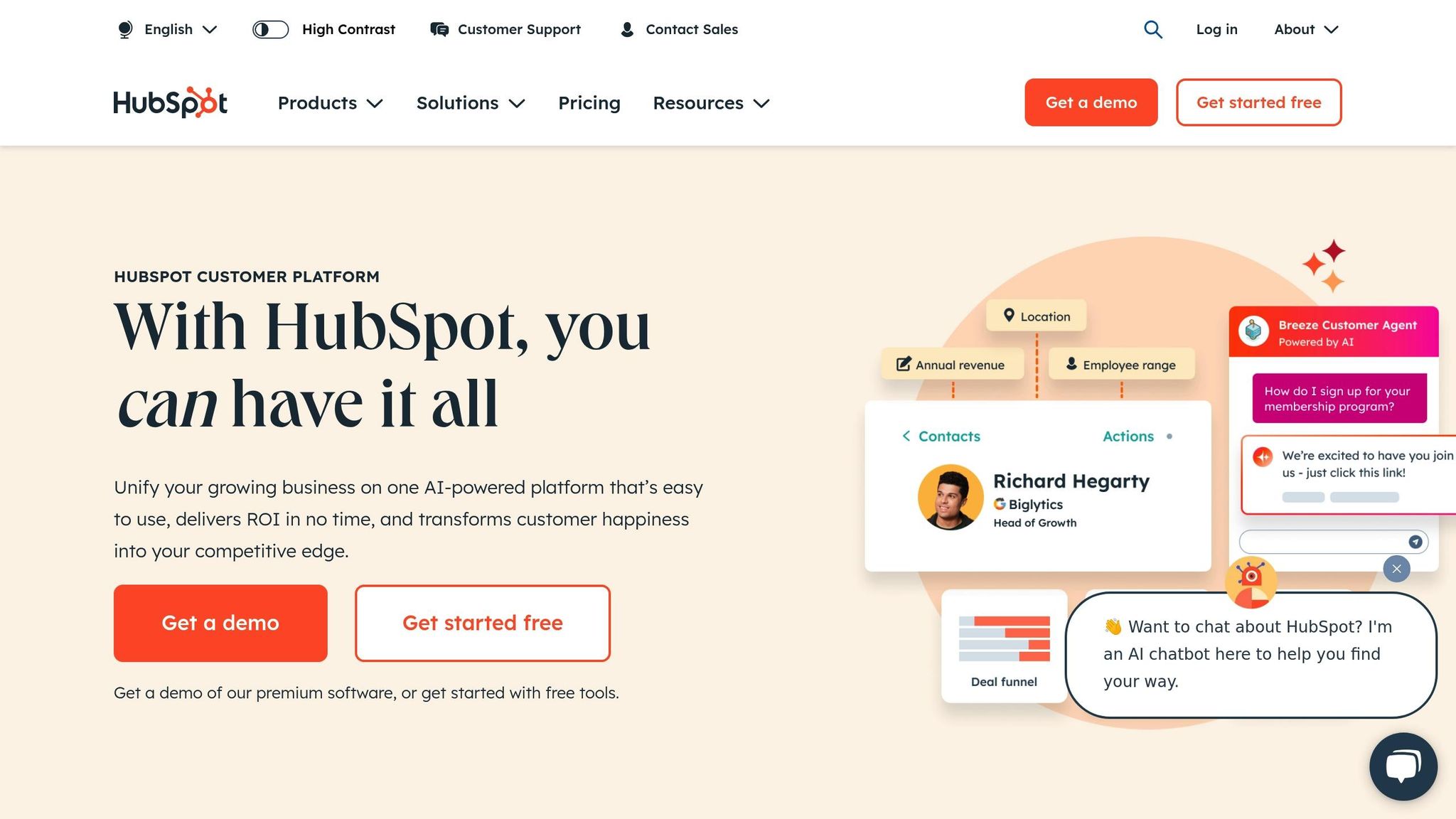
HubSpot SEO Assistant brings together SEO tools and marketing automation, creating a seamless connection between SEO efforts, lead generation, and CRM. Impressively, 87% of marketers using HubSpot in 2024 reported that their strategies were effective.
Keyword Optimization
HubSpot's keyword optimization is powered by Semrush, offering built-in tools to identify keywords that perform well. This feature is particularly useful for niche markets and teams with limited resources. The AI Blog Generator helps create SEO-friendly content, while HubSpot enables fine-tuned adjustments to meta tags, URLs, anchor links, and headers to enhance search visibility. For local businesses, it generates geo-targeted content and incorporates localized keywords to boost rankings.
Anna Rubkiewicz, a HubSpot user, highlights the importance of aligning content with search intent. She advises using clear, instructional phrases like "Learn how to" or "Discover tips for" for informational searches, and action-focused terms like "Buy now" or "Sign up today" for transactional intents.
Content Scoring and Planning
HubSpot's SEO Recommendations tool provides actionable insights to refine content and improve search rankings. Integrated with its content management system, the tool is designed to optimize for voice search by prioritizing natural language queries and offering concise answers to commonly asked questions. These features ensure that SEO efforts don't just improve rankings but also drive lead generation and customer acquisition. Moreover, HubSpot's content tools work seamlessly with its integration framework, simplifying workflows.
Integration Capabilities
HubSpot integrates with essential platforms like Google Workspace, Slack, Zoom, Salesforce, and Shopify. Virtual assistants further simplify the process of connecting third-party apps. Its integration with Google Search Console provides deeper insights into search performance, enhancing the overall marketing toolkit. According to HubSpot’s CMO, Kipp Bodnar, leveraging AI-driven ad design for subscriber growth reduced contact acquisition costs by an impressive 300%.
ROI and Cost Efficiency
HubSpot offers a free plan with basic SEO tools, making it accessible for small businesses just starting out. For those looking for more advanced features, the Marketing Hub Starter plan costs $15 per month per user, while the Professional plan is priced at $800 per month for three seats. The potential return on investment is substantial - SEO ranked as one of the top three marketing channels for ROI in 2024. Digital marketing, in general, has been shown to generate up to three times more leads and deliver an average ROI that’s 28% higher than traditional methods.
Viktor Nagornyy, Marketing Strategist at ProjectArmy, puts it succinctly:
"HubSpot is rarely the problem, it's the lack of use or mis-directed effort that's the real marketing problem. You wouldn't blame a car for going in the wrong direction if you're the one driving it."
sbb-itb-ad96eed
4. Scalenut
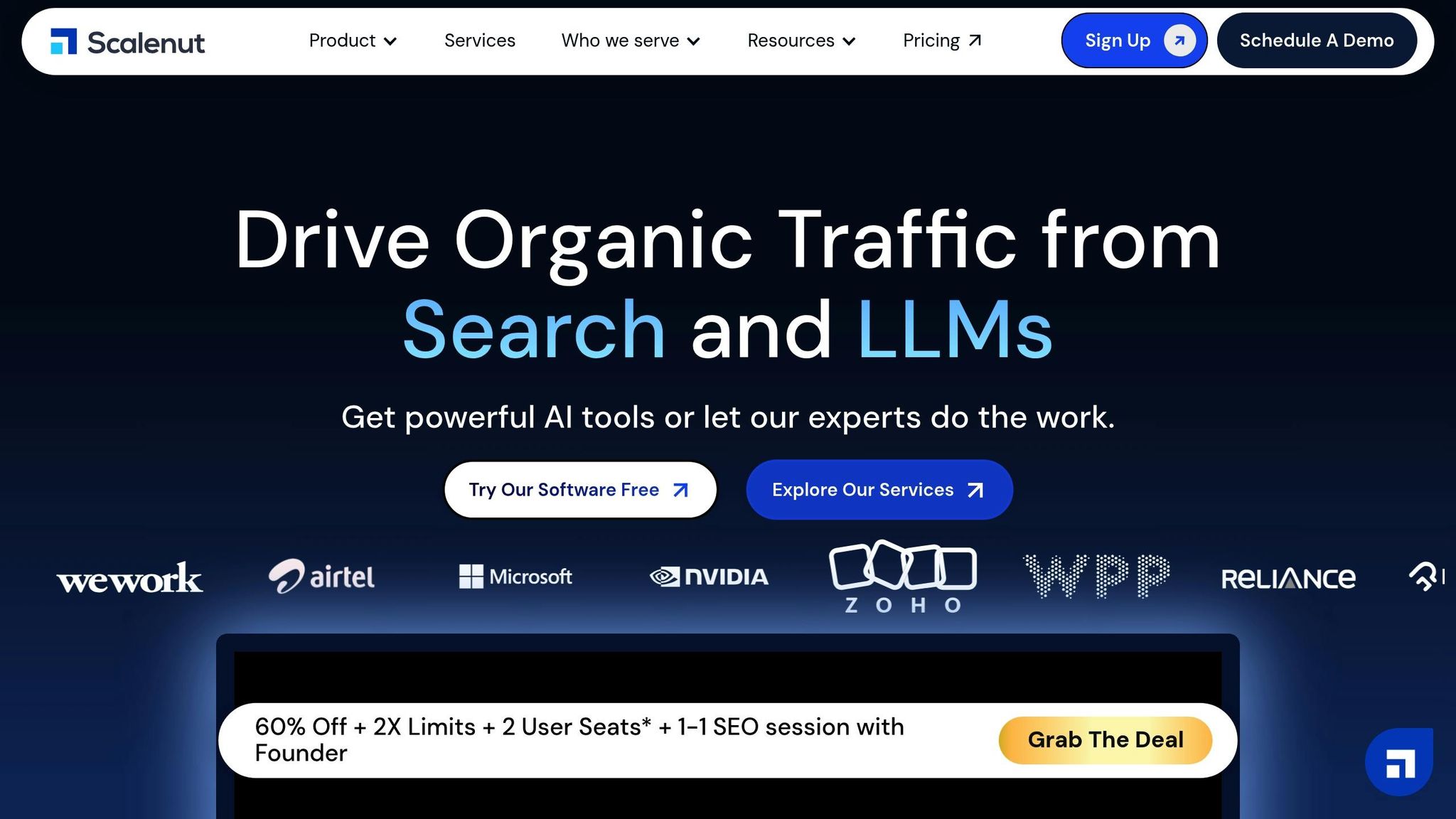
Scalenut is an AI-driven platform designed to simplify SEO and content creation. With a stellar 4.8-star rating from SEO professionals and the trust of over 1 million marketers, it combines keyword research, content creation, and optimization into one user-friendly interface. This makes it especially appealing for businesses looking to improve their SEO without adding extra resources to their team.
Keyword Optimization
Scalenut’s Keyword Planner offers detailed insights into search volume, competition, and related keywords. Using NLP analysis, it aligns keyword strategies with user intent, providing a roadmap for more effective optimization.
The platform dives deep into keyword usage, meta tags, and URLs, offering actionable tips for improvement. Small businesses, in particular, benefit from its ability to uncover niche opportunities and long-tail keywords often overlooked by larger competitors.
Some real-world success stories highlight its impact:
- Jungleworks saw a 20% boost in organic traffic within 5 months.
- Noelle Salon & Spa Inc. increased its visitors from 11,000 to 64,000 in just two months.
"Scalenut has become an invaluable SEO tool that enables our team to conduct competition analysis which contributes to high rankings in Google. The SEO functionality along with the AI writing capabilities makes Scalenut a winner!" - Gary G, CEO
These insights lay the groundwork for Scalenut’s powerful content planning tools.
Content Scoring and Planning
Scalenut’s content planning features include real-time SEO scoring and automated interlinking, helping businesses craft strategies that align with trending search topics. Its "Cruise Mode" allows users to generate SEO-optimized content quickly by inputting specific topics or keywords.
The content optimizer reviews existing material, refining keyword density, meta tags, and URL structures. This feature helps businesses pinpoint gaps in their content strategies and identify topics their target audience is actively searching for.
"Scalenut's AI tools help me research, create, and optimize content effortlessly. It's like having an SEO expert on demand!" - Benedict T., SEO Consultant
Scalenut also enhances content reliability by incorporating credible statistics and helps businesses establish a consistent tone that aligns with SEO best practices. Users often commend its intuitive keyword grouping and AI-driven content writing tools.
Integration Capabilities
One of Scalenut’s strengths is its seamless integration of SEO analysis with content workflows. By centralizing keyword research, content creation, and optimization, it eliminates the need for juggling multiple tools. This streamlined process is particularly beneficial for small businesses that prioritize efficiency over complexity.
ROI and Cost Efficiency
Scalenut is not just about technical features; it also delivers clear financial benefits. Pricing starts at $49 per month for the Essential plan, $79 per month for Growth, and $149 per month for Pro, with each tier tailored to different business needs.
The platform has an impressive 4.7 average rating for value for money, surpassing the industry average of 4.5 in the blog category. Many users report substantial savings, with some businesses cutting costs by $1,000 per month compared to hiring additional SEO resources.
"My website traffic grew from 11k to 64k in two months. Their services are by far the best of all SEO firms I have worked with. They are affordable." - Noelle Spinosa, President of Noelle Salon & Spa Inc.
Scalenut’s ROI potential is evident, with results like 2x organic growth in under 4 months and 80% increases in traffic within 5 months reported by users. For small businesses, this represents a significant return on investment, making it a cost-effective alternative to hiring dedicated SEO professionals or agencies.
To top it off, Scalenut offers a suite of free AI-powered SEO tools - including an on-page SEO checker, SEO analyzer, keyword finder, and keyword density checker - allowing businesses to explore its features before committing to a paid plan.
5. MarketMuse
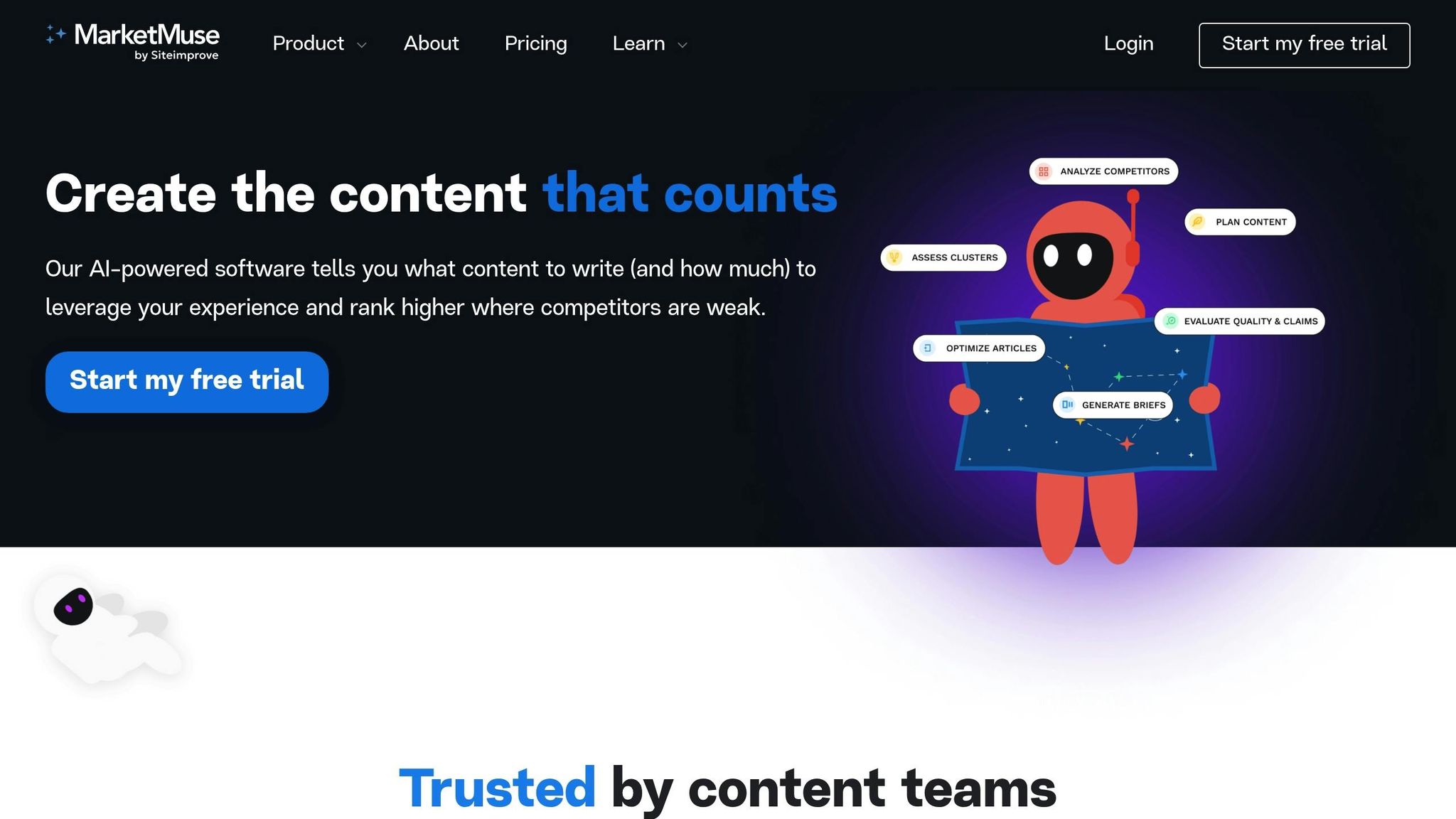
MarketMuse is a standout AI-powered content intelligence platform designed to refine SEO strategies. Unlike tools that focus heavily on keyword density, MarketMuse uses advanced AI to create detailed topic models, guiding users in crafting and optimizing their content for better results.
One impressive example of its impact is InsideTheMagic.net, which saw a staggering 74× growth in pageviews over four years by adopting MarketMuse's data-driven strategies. This demonstrates how smart topic modeling can significantly boost content performance.
Content Scoring and Planning
MarketMuse specializes in building data-backed content strategies. It identifies gaps and opportunities in your content, helping businesses improve their search visibility. Its content brief feature is particularly useful, offering detailed guidance on topics, keywords, and competitor insights to streamline the content creation process.
"MarketMuse Inventory helps us know what's working, what's not, and what we need to dedicate more time and resources to. Having clear metrics to back up why we're prioritizing particular content has been super helpful." – Jonathan Louvis, Online Content Marketing Manager
The platform also creates in-depth plans for tackling topic clusters, making it an excellent tool for small businesses looking to establish authority in specific areas. This approach naturally enhances keyword strategies as well.
Keyword Optimization
When it comes to keywords, MarketMuse takes a personalized approach. It provides metrics to show how challenging it might be for a specific site to rank for certain keywords. Its Research tool highlights new opportunities by identifying unmet search queries. Beyond that, it suggests topics, keywords, and content structures that go beyond traditional keyword research methods.
Integration Capabilities
MarketMuse integrates seamlessly into existing workflows, simplifying research and content audits. Its content inventory tool helps track performance, pinpointing which pieces need updates or improvements to maintain consistent SEO results. These integrations make it easier for businesses to see measurable returns on their investment.
ROI and Cost Efficiency
MarketMuse is known for delivering strong results when its recommendations are followed. Users report seeing 4× to 10× more traffic on content optimized with the platform. While there is a free plan with limited features, paid plans range from $99 per month for the Optimize plan to $499 per month for the Strategy plan. Annual plans can cost between $7,200 for the Standard plan and $12,000 for the Premium plan. A 2022 study published in the International Journal of Marketing noted that businesses using MarketMuse experienced an average 20% growth in organic traffic within six months.
"We see 4×–10× more traffic with pieces we optimize with MarketMuse." – Zoe Hawkins, Principal Content Manager, Sumo Logic
With an overall rating of 4.5/5.0, MarketMuse is well-regarded for its powerful optimization tools and precise keyword research. However, some users find the interface complex, and the subscription costs can be steep. Despite these drawbacks, MarketMuse remains a strong choice for small businesses aiming to elevate their SEO strategies with advanced AI tools.
Pros and Cons
When choosing an SEO tool, it's crucial to weigh the benefits and drawbacks of each option. The table below breaks down how various tools stack up for small businesses, helping you align their features with your needs and budget.
| Tool | Pros | Cons |
|---|---|---|
| Semrush Content Toolkit | • Offers a full suite of tools for keyword research, content optimization, and competitor analysis • ContentShake AI Pro at $60/month provides good value for content creation • Delivers measurable results, like Wave Plastic Surgery's 74% increase in website visits and 83% jump in phone calls |
• High starting cost at $139.95/month for the Pro plan • Can feel overwhelming for beginners due to its extensive features • May include more tools than small businesses actually need |
| Surfer SEO | • Excels in content optimization with real-time scoring • Simple, user-friendly interface • Affordable Essential plan at $99/month |
• Limited keyword research compared to all-in-one platforms • Focuses mainly on content optimization, lacking broader SEO tools • May not meet the needs of businesses requiring a comprehensive SEO solution |
| HubSpot SEO Assistant | • Integrates seamlessly with HubSpot CRM and marketing tools • Offers actionable recommendations within the content creation process • Ideal for businesses already using HubSpot |
• Requires a HubSpot subscription, increasing overall costs • Less robust than dedicated SEO tools for advanced optimization • Limited SEO capabilities outside the HubSpot ecosystem |
| Scalenut | • Combines content creation and SEO optimization in one platform • More budget-friendly than many premium tools • Great for small teams managing both content and SEO tasks |
• Newer platform with a less established track record • Lacks some advanced features found in more mature tools • Limited integration options with other marketing platforms |
| MarketMuse | • Advanced topic modeling for deeper content insights • Strong planning features for content strategy |
• Expensive, with plans starting at $149/month and custom pricing for larger teams • Complex interface that may overwhelm new users • Requires significant time to master due to a steep learning curve |
This table highlights the strengths and weaknesses of each tool, but it's worth noting that the right choice depends on your specific circumstances. Research shows that 68% of companies report higher ROI when using AI tools, though the cost of these platforms can be a hurdle for smaller businesses.
For businesses with tight budgets, affordable SEO tools can still provide a solid starting point. On the other hand, companies with dedicated content teams might find premium tools like Semrush or MarketMuse worthwhile, especially if they deliver measurable returns. Another option is pairing an affordable tool with free resources to balance cost and functionality.
Keep in mind, the success of any tool depends on how well it's used. AI tools can streamline repetitive tasks and save time, but consistent effort and careful oversight are essential to maintaining quality and staying aligned with your brand. When selecting an SEO tool, consider your current expertise, budget, and specific challenges. Affordable tools often stand out for their clear metrics and beginner-friendly interfaces, making them a great choice for those just starting out.
Conclusion
After diving into the detailed comparisons of AI SEO tools, it's evident that picking the right one boils down to aligning your specific needs with your budget and business objectives. Research indicates that 68% of companies see higher ROI in SEO and content marketing when leveraging AI tools. But the real magic lies in finding the tool that fits your unique situation.
Each tool we've discussed offers distinct advantages based on performance, ease of use, and pricing - making it easier to match them to the stage your business is in. For those working with limited budgets, free options like Google Search Console or Moz's free tools handle basic SEO tasks effectively. Tools like Frase and Ubersuggest's Individual Plan are affordable solutions for essential keyword research and content optimization.
If you're part of a growing business with a dedicated content team, mid-tier tools can strike the right balance between cost and functionality. These tools are well-suited for tackling competitive markets and scaling your efforts.
For small businesses ready to take their SEO to the next level, investing in advanced platforms can unlock the features needed for more sophisticated strategies. These comprehensive tools are designed to handle the challenges of competitive industries.
As content marketer Margarita Loktionova puts it, "Choose a tool that suits your specific needs and context". A smart approach is to begin with one or two essential tools and expand as your business grows. Remember, even the most powerful tool requires consistent use and a well-thought-out strategy. Look for platforms that integrate seamlessly with your existing systems and prioritize the features that matter most to your goals - whether that's local SEO, content creation, or technical optimization.
At its core, the right AI SEO tool should save you time on repetitive tasks while delivering actionable insights that drive real results. By focusing on tools that align with your business needs, you'll be well on your way to improving search rankings and fueling business growth.
FAQs
How can AI-powered SEO tools help small businesses boost their online traffic and profitability?
AI-powered SEO tools are transforming how small businesses build their online presence. They take the complexity out of tasks like keyword research, content optimization, and competitor analysis, offering automation that saves both time and effort. And the best part? They deliver results you can actually measure.
With AI, small businesses can produce well-optimized, high-quality content, monitor performance metrics, and spot new growth opportunities with greater precision. These tools also help improve user experience, boost search engine rankings, and attract more organic traffic - all of which contribute to better profitability. Plus, they’re often budget-friendly, simple to use, and designed to meet the specific needs of smaller businesses.
What should small businesses look for when selecting an AI SEO tool?
When selecting an AI SEO tool, small businesses should focus on a few important aspects to make sure it aligns with their needs. First, define your goals - whether it's enhancing keyword research, optimizing your content, or monitoring performance. The tool should be user-friendly, provide reliable data, and stay within your budget while offering solid value.
It's also wise to choose a tool that can grow alongside your business and works well with the platforms you already rely on. Strong customer support and access to helpful resources can make a big difference in maximizing the tool's potential. By keeping these factors in mind, you'll be better positioned to pick an AI SEO tool that delivers real results and supports your business as it expands.
What are some affordable AI-powered SEO tools with strong features for small businesses?
If you're running a small business on a tight budget, you don't have to miss out on the benefits of SEO. There are plenty of affordable AI-powered SEO tools that can help you improve your online visibility without draining your wallet. For instance, Ubersuggest offers keyword research and site audit features starting at just $12 per month - perfect for getting started. Need help crafting SEO-friendly content? ContentShake AI has you covered, and Semrush Copilot provides straightforward, tailored SEO recommendations specifically designed for small business owners.
Other great options include SurferSEO, which focuses on content optimization, and ChatGPT, a handy tool for brainstorming new ideas. These tools are budget-friendly yet loaded with features, making them an excellent choice for small businesses looking to climb the search rankings and grow their online presence.
